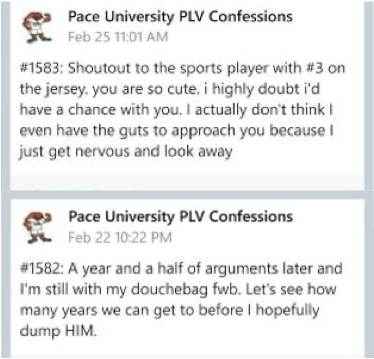Pace Students Dabble In Social Media

Pace students have created social media accounts as outlets to share their thoughts and experiences, sometimes anonymously, with peers.
50 random students were surveyed on their opinions of which pages they find relevant, which ones they don’t, and why they feel that way.
About half of the fifty people who were surveyed about Pace social media expressed that they follow these pages because they are funny and allow them to share their feelings about their life that are specific to Pace.
Findings suggest that students from both Pleasantville and Briarcliff campuses feel that Pace Confessions is the most preferred social media network that connects Pace students due to its “convenient to access” for students on this campus.
“[Pace Confessions] talks about the juicy tidbits of the campus that only Pace students could understand,” freshman nursing major Kirk Pineda said.
Some students have choose not to engage in the specific Pace University pages because of the negative effect it can have on those individuals mentioned in the posts and the fact that there is no regulation on submissions. Students have found, through much trial and error, that the pages will publicly post any submission.
Other students agree that it’s the open forum of the pages that have the propensity to ostracize others without any sort of repercussions. Followers of these accounts find the candid nature of Pace’s social media sites to be both a positive and a negative aspect of these pages.
“[Social media] is not good because rumors start that way,” sophomore Political Science major Patrick Dooley said.
Words like, “scandalous,” “cruel,” “fake,” “repetitive,” and “cyber bullying” were used to describe peoples’ caution and abstention when using social media. In general, students use, post, and share these pages with a harmless mentality and desire to connect with other students on another level.
Students get embarrassed by what people write about them without any right to track down who wrote about them due to the anonymity. Those mentioned in posts are usually tagged in comments left by someone they know who saw the post. People referred to on these sites either comment back with an interest or disgust in the opinions expressed in the post.
“There is no point in expressing feelings for someone this way,” said an anonymous student, “because even if the mentioned party is interested, anyone can comment back as if they had posted it.”
The social media aspect of this generation’s communication has been implemented into pages associated with Pace University students. Some students follow the Pace-centric accounts, while others choose not to do so or have never heard of the accounts. Some pages that Pace students have admitted to using or viewing on a regular basis are Pace Confessions and Pace Lovebugs which are Facebook pages, as well as @PaceGirlProblem, @PaceProblems, and @PacePains, which are on Twitter.
Some students don’t follow the less popular accounts because they don’t remain active with posts.
Freshman communications major Ashley Beutham feels that those who follow Pace-pointed social media accounts are simply that, followers.
Additionally, fourteen percent of those surveyed voted that they don’t use any form of Pace centered social media.
However, all students agree that if posts are pointing out a particular person, it could create far more damage than any of the communal humor it was aiming toward. The question to consider is whether or not these social networking sites will further unite or divide the Pace community.
Your donation supports independent, student-run journalism at Pace University. Support the Pace Chronicle to help cover publishing costs.

